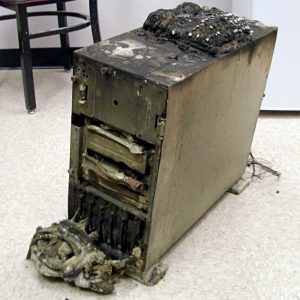I’m quite backed up
I have been a firm believer in redundant computer hardware for years. I have my important data on RAID 1 (which is two mirrored drives so that if one fails, there is another drive with intact data). It’s a bit expensive, since you pay twice for storage, but after some close calls, I have realized that my data’s value is far more than the price of a single hard drive.
I have also tried to take the data on various machines and get the backups in one place.
After talking with one of the owners of the business where we have a safe deposit box, I realized that I didn’t have a “meteor” contingency: What if a meteor hit the house and everything in it was destroyed? I have one now.
In addition to the redundant hardware, I’m in the process of backing up to two portable hard drives. One will stay in the safe deposit box while the other one will get backed up automatically with the latest important files. Once a month or so, I’ll swap out the drives. I also have “cloud” accounts so that the newer files that haven’t made it to the offsite backup are somewhere outside the house as well.
Is this perfect? No. But it has several facets that make it workable:
- It’s far better than nothing
- It’s as close to automated as I can make it. If the data transfers require any manual intervention, they won’t get done. The only thing I have to do is swap out the drives and move them between the safe deposit box and the house.
- It uses commonly available data formats and software. I’m using rsync on a Linux box. There is absolutely no vendor lock in, so I don’t have to worry about finding licenses to get back after a loss of some sort.
- Item 3 makes recovery as close to “plug and play” as possible.
So what’s important data? That’s going to be a bit different for everyone. Some of my important files would be considered losable by most and I’m sure I’m not saving some stuff that would be critical to others.
In general terms, here’s what is being saved (in no particular order):
- Scanned documents and records. We have an excellent document scanner at home and a good digital workflow. Everything gets scanned into searchable PDFs: bills, insurance cards, ID cards, mail, receipts, etc. And it’s fairly well organized. The scanner was expensive, but it has more than paid for itself in convenience and peace of mind.
- The “Documents” folders from all active computers. We both have lots of documents going back years. Everything form love notes to resumes.
- Digital photos. Raw, processed, organized or not. It’s all in there.
- Downloaded software that’s installed on our machines. Makes restoration a lot easier if you have all the installations in one place.
- Media files (movies and music). I really really really don’t want to have to re-rip the DVDs and CDs, not to mention the months of spare time I put in organizing it all.
- My home server’s web root. I am a programmer. This is where I do a lot of my work.
- Backups from web hosting server. My entire online life needs a good backups.
- Archived files from decades of being a computer nerd that I need to go through one day. This is probably cruft, but if there’s room, it’s better to back up more than you need than the other way around, you know?
- Books I have in digital form (which is most of my books these days). I have also tried to convert from vendor specific formats to generic for wider device compatibility.
Since I’m “a computer guy” my process is a bit technical and probably more complex than most people would need. But if you don’t have an “in house” backup system, get one now.You can get a multi-terabyte external drive with basic backup software for under $150 these days. If that is a lot of money, think about how much it would cost to reconstruct your data.
I would also urge you to figure out a way to get your data offsite as well, even if it’s an online service. If you want a Box.com invitation (50GB free) just ask, or go sign up!
My tolerance for data loss is zero bytes and I have done what I can to make that happen. Think about what your tolerance for data loss is and act accordingly.

yep… I have mutiple places that which is important to me is stored 🙂
Willie Combs liked this on Facebook.
Double backups. My whole house would have to shit the bed. And when I have a full time job, I keep one if those two backup devices at work.
Kathleen Trelease Blackwood liked this on Facebook.
Suzzie Sattari liked this on Facebook.
I think only yhe plumbings backed up at our house.